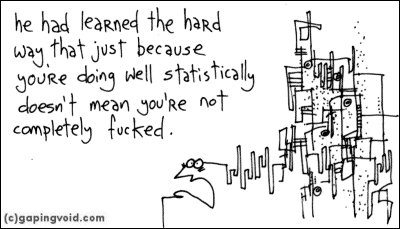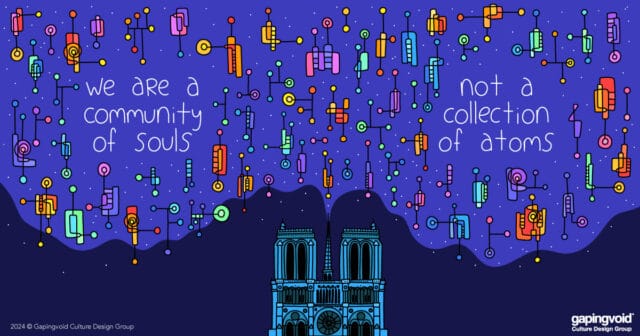
Back in 2004, I came up with probably my favorite marketing-related insight ever:
“THE MARKET FOR SOMETHING TO BELIEVE IN IS INFINITE.”
We are here to find meaning. We are here to help other people do the same. Everything else is secondary.
We humans want to believe in our own species. And we want people, companies and products in our lives that make it easier to do so. That is human nature.
It was a real EUREKA! moment for me. Meaning. A-HA! That’s what we are always going to be willing to pay for. And somehow, even in a small way, your product has to be aligned with your customer’s never-ending search to find meaning in his or her own life.
Why does most marketing fail, or at least, create unsatisfactory results? Because most marketing is oblivious to this real human drive to find meaning.
Instead, most marketing appeals to rather trivial aspects of human existence. Your bum will look smaller with this product. Your shoulders will look bigger with this product. Your friends will be impressed if they see you using our product. Your living room will smell nicer with this product. You’ll save $13.42 if you use our product, instead of their product. Yada, yada, yada…
But as we know, that’s not why we really buy most products. Like I said in 2006:
If people like buying your product, it’s because its story helps fill in the narrative gaps in their own lives.
Human beings need to tell stories. Historically, it’s the quickest way we have for transmitting useful information to other members of our species. Stories are not just nice things to have, they are essential survival tools.
And yes, the stories we tell ourselves are just as important than the stories we tell other people.
Ergo, marketing is not about selling. Marketing is figuring out where your product stands in relation to personal narrative.
So where does your product fit into other people’s narrative? How does telling your story become a survival tool for other people? If you don’t know, you have a marketing problem.
Narrative gaps. It’s all about the narrative gaps.
We find meaning, we fill in the narrative gaps, when we transform ourselves. When we transform from unemployed single mother to world’s richest woman [Like what happened to Harry Potter’s JK Rowling]. When we go from a size-12 dress to a size-6 dress. When we land our first real job promotion. When we go from single horny guy to happily married father of six. This need to constantly transform ourselves, from one state of being to another, never goes away. We are fluid creatures. We crave re-invention like we crave food or sex. And when we lose the capacity to transform ourselves, when we get stuck in a rut, is when life’s meaning starts to dry up.
Fine, I hear you say, that’s great if you’re selling “transformative” stuff like exercise equipment or Tony Robbins seminars, but what about more prosaic products, like snacks or toothpaste?
Simple: Then your product exists in context of a much bigger story- your custumer’s. Like being an extra in a much bigger movie. Or a single sentence in a much bigger book.
It’s OK to play a minor role. As social animals, we are happiest when we feel we belong to something much larger than ourselves. A faith. A movement. A tribe. A noble calling. A Purpose-Idea.
And what is true for people, is also true for products. They too are happiest when they belong to something much larger than themselves. A faith. A movement. A tribe. A noble calling. A Purpose-Idea.
The people who inspire us the most are the people who aim higher than the limitations imposed upon them. Triumph over adversity; it’s the oldest story in the world.
The products that inspire us the most are the ones that also aim higher than the limitations imposed upon them. Triumph over adversity; it’s the oldest story in the world.
So what’s your story going to be?
[Bonus Link:] Harold Jarche left a neat quote in the comments. From Neal Stephenson’s Anathem, page 414:
“So I looked with fascination at those people in their mobes [cars], and tried to fathom what it would be like. Thousands of years ago, the work that people did had been broken down into jobs that were the same every day, in organizations where people were interchangeable parts. All of the story had been bled out of their lives. That was how it had to be; it was how you got a productive economy. But it would be easy to see a will at work behind this: not exactly an evil will, but a selfish will. The people who’d made the system thus were jealous, not of money and not of power but of story. If their employees came home at day’s end with interesting stories to tell, it meant that something had gone wrong: a blackout, a strike, a spree killing. The Powers That Be would not suffer others to be in stories of their own unless they were fake stories that had been made up to motivate them.”



